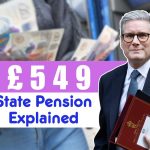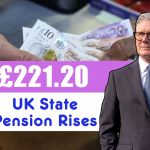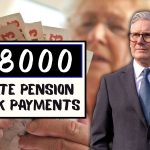As the cost of living crisis continues to weigh heavily on UK households, discussions about a new round of government support are resurfacing. In particular, many social media posts and online articles are claiming that the Department for Work and Pensions (DWP) will issue a new £400 Cost of Living Payment in October 2025.
But how accurate are these claims? While the need for help is undeniable, there’s currently no official confirmation from the government that such a payment will take place. Let’s break down what’s real, what’s speculation, and what financial help is genuinely on the horizon.
No Official Confirmation Yet from the DWP
Let’s get straight to the facts — the UK government has not announced any new £400 Cost of Living Payment for October 2025. Despite online rumours, the DWP has not released a statement confirming any new lump-sum support this autumn.
The previous Cost of Living Payment series concluded in early 2024, and so far, no follow-up scheme has been unveiled. The ongoing speculation appears to be driven by unofficial news outlets and misleading online videos rather than verified information.
Officials urge citizens to rely only on official government sources, such as GOV.UK or DWP updates, and to ignore any websites or messages asking for applications or personal details — as these are likely scams.
Reviewing Past Cost of Living Payments (2022–2024)
To understand why people believe another payment might come, it’s useful to look back at the previous Cost of Living Payment programs that ran from 2022 through early 2024. These payments were automatic and aimed at helping low-income households manage record-high inflation and energy bills.
| Payment Amount | Qualifying Benefit | Payment Period |
|---|---|---|
| £299 | Tax Credits | 16–22 February 2024 |
| £300 | Tax Credits | 10–19 November 2023 |
| £301 | Tax Credits | 2–9 May 2023 |
| £324 | Tax Credits | 23–30 November 2022 |
| £326 | Tax Credits | 2–7 September 2022 |
These payments were deposited automatically into recipients’ accounts and did not require applications — a system praised for its simplicity and speed.
Who Qualified for Previous Cost of Living Payments
The earlier schemes were aimed specifically at low-income households or those receiving means-tested benefits. The same structure would likely apply if a future £400 payment were introduced.
Qualifying benefits included:
- Universal Credit
- Income-based Jobseeker’s Allowance (JSA)
- Income-related Employment and Support Allowance (ESA)
- Income Support
- Pension Credit
- Child Tax Credit
- Working Tax Credit
For those receiving both DWP and HMRC benefits (like Universal Credit and Tax Credits), the DWP handled the payment to prevent duplication. In joint claims, only one payment was issued per household.
This system ensured fair distribution while minimizing administrative errors — a model that could return if another round of payments is approved.
How Previous Payments Were Distributed
One major advantage of the Cost of Living schemes was their ease of delivery. Beneficiaries did not have to apply or fill out forms.
Key features of past payments included:
- Automatic payments: Funds were directly deposited into bank accounts linked to benefit claims.
- Non-taxable: The payments were tax-free and did not count toward the benefit cap.
- No effect on other support: They did not impact eligibility for other benefits or financial assistance programs.
This streamlined process made the system both efficient and accessible — especially for vulnerable individuals who may have struggled with application-based programs.
Why the Rumours Started
The speculation about a new £400 Cost of Living Payment in 2025 has not emerged from nowhere. It’s rooted in the continuing financial challenges facing millions of UK households.
Even though inflation has fallen from its 2023 peak, core living expenses remain stubbornly high. Food, rent, and fuel prices are still straining budgets, and energy debt has become a growing concern.
According to recent figures, 7.3 million adults were living in food-insecure households as of early 2025 — a number barely improved since the height of the crisis. Meanwhile, energy arrears reached £3.9 billion by late 2024, doubling over five years.
These troubling numbers have led campaigners and charities to pressure the government for a new round of support — prompting widespread speculation about the rumored £400 payout.
Official Support Still Available in Late 2025
While a new £400 Cost of Living Payment has not been confirmed, several forms of targeted support are officially scheduled for late 2025. These include:
1. Winter Fuel Payment
- This is an annual, tax-free payment designed to help pensioners cover heating bills during the colder months.
- Those of State Pension age are generally eligible automatically.
- Letters confirming eligibility will be sent in October or November 2025, and payments will typically arrive between November and December.
2. State Pension Increase
- From 2025, State Pension recipients will receive an annual increase, adding over £400 per year to the average pension income.
- This is not a one-off bonus but part of the annual uprating linked to the triple lock policy — ensuring pensions rise in line with inflation, wages, or 2.5%, whichever is highest.
These confirmed measures mean pensioners and older residents will receive real and predictable financial support, even in the absence of a new lump-sum scheme.
Why the Government Hasn’t Announced a New Scheme (Yet)
There are two main reasons why the government has not yet confirmed another broad-based Cost of Living Payment:
- Fiscal constraints: With public borrowing and inflation still high, large one-off cash transfers would add financial pressure on the Treasury.
- Shift toward structural reforms: Instead of short-term grants, the government’s focus has shifted to permanent benefit adjustments — such as the £725 Universal Credit uplift announced earlier in 2025 — which provide long-term relief rather than temporary boosts.
Still, the government hasn’t ruled out further targeted help if economic conditions worsen.
Beware of Scams and False Information
Given the surge in online rumours, it’s vital to stay alert for scams. Fraudsters often exploit public confusion around DWP payments to steal personal data.
Key safety reminders:
- Never provide personal information (like National Insurance or bank details) through links or calls claiming to offer payment applications.
- Ignore messages or websites that claim you must “register” for the £400 Cost of Living Payment.
- Always verify updates directly from official GOV.UK pages or trusted news outlets.
The DWP never contacts people by text or email asking for payment details.
The Bigger Picture: What Comes Next
The ongoing conversation about a £400 Cost of Living Payment underscores a deeper issue — the cost pressures on UK households have not disappeared, even as inflation stabilises.
For millions, the reality remains tough: energy bills are elevated, grocery prices haven’t returned to pre-pandemic levels, and housing costs continue to climb. As a result, advocacy groups and Members of Parliament continue to push for targeted assistance, especially for those on Universal Credit, Pension Credit, and disability benefits.
The government has indicated that future support decisions will depend on economic data heading into winter 2025–26 — meaning any new payment, if introduced, could be announced later this year.
FAQs – £400 Cost of Living Payment October 2025
Q1. Has the government confirmed a £400 Cost of Living Payment for October 2025?
No. There has been no official confirmation from the DWP or UK government regarding any new £400 payment.
Q2. Who was eligible for past Cost of Living Payments?
Previous payments were given to households receiving benefits like Universal Credit, Pension Credit, Income Support, or Tax Credits.
Q3. How were the past payments made?
They were automatic, sent directly to recipients’ bank accounts, and were tax-free. No application was required.
Q4. What financial support is confirmed for late 2025?
The Winter Fuel Payment and State Pension increase are both confirmed and will benefit millions, especially older citizens.
Q5. Could a new payment still be announced later this year?
Possibly. The government hasn’t ruled out further assistance, but no official decision has been made yet.











